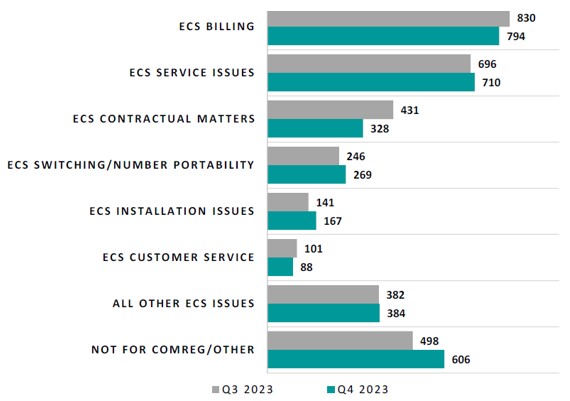The Burning Question: What Makes an MVNO Thrive?
Across the vast online landscape of MVNO information, a critical question consistently arises: what separates successful MVNOs from the rest? Is simply offering aggressive deals enough to win customers? While competitive pricing can be a draw, it’s not a guaranteed path to long-term success.
The key lies in prioritizing a superior customer experience. This translates to loyal subscribers, a vital ingredient for any MVNO’s sustainability. To unlock this potential, let’s delve into understanding the very issues that drive customer dissatisfaction. Analyzing complaints about pricing, billing, service quality, and customer service can reveal valuable insights into what truly matters to your target audience.
Let’s delve into some data from several regions to illustrate a crucial point: while MVNOs operate worldwide, customer frustrations tend to converge on similar themes.
Here’s a glimpse into what concerns mobile users in Spain, according to reports from their regulatory body: expensive services:
- Pricing and Billing Issues: Customers often find services expensive, with a lack of transparency in invoices and pricing structures. Additionally, they may feel they aren’t getting clear information on service inclusions and contractual terms.
- Service Quality Concerns: Interruptions, unreliable connections, and improper charges can significantly impact user experience.
- Customer Service Woes: Inefficient or frustrating interactions with customer support leave users feeling unsupported and dissatisfied.
Moving to the UK, a survey of over 3,700 mobile customers revealed similar concerns. Consistently poor phone signal, unexpected price hikes, unwanted marketing messages, and of course, poor customer service, all ranked high on the list of user grievances.
This trend of common pain points continues across the countries we’ve examined. In Ireland, a Q4 2023 survey conducted by ComReg’s Consumer Care found a similar distribution of complaints regarding Electronic Communication Services (ECS).

The sentiment of customer dissatisfaction isn’t limited to Europe. A recent study in South Africa highlighted similar pain points, but with an interesting regional twist:
- Customer Service Struggles: Like their European counterparts, South African mobile users expressed frustration with inefficient feedback and issue resolution processes. Call centers remained the most complained about channel.
- Financial Service Concerns: This point is particularly relevant in African markets, where the rise of FinTech has integrated financial services into the mobile experience. Customers in South Africa reported issues specific to these offerings.
- Network Coverage and Responsiveness: Consistent themes of network coverage complaints and a general lack of responsiveness from providers emerged in South Africa, mirroring concerns elsewhere.
- Building Trust: The South African study also emphasized the importance of building trust with customers
Source: https://www.pwc.co.za/en/publications/south-african-telecommunications-sentiment-index.html
While we could delve deeper into additional studies from regulators like IFT in Mexico or CRA in Qatar, the core themes remain remarkably consistent across the globe. There might be regional variations, such as the prominence of FinTech-related complaints in Africa. But overall, MVNO customers worldwide are united in their desire for:
- Transparency and Value in Pricing: Clear pricing structures, easy-to-understand billing, and competitive rates are key.
- Seamless Service and Network Quality: Reliable connections, consistent coverage, and minimal disruptions are fundamental for a positive user experience.
- Prioritizing the Customer: Efficient, helpful, and trustworthy customer support builds trust and loyalty.
Facing the Challenge
Impact of MVNO Model on Improvement Strategies
There’s no doubt that the MVNO model and size significantly influence how they address the key areas identified earlier (pricing/billing, customer service, network quality). Let’s explore this further:
Billing: While all MVNOs, regardless of model (reseller, light MVNO, full MVNO), are ultimately responsible for billing their customers, the level of control over the process varies.
- Resellers and Light MVNOs: These models rely heavily on their host network for billing information (CDRs, delivery reports). Detailed service level agreements (SLAs) become crucial to ensure clear breakdowns of charges and responsibilities.
- Full MVNOs: They have more control over billing systems and data, allowing for greater flexibility and potentially faster issue resolution.
Pricing and Product Strategy:
- Light MVNOs and Full MVNOs: These models have more flexibility in designing their product and pricing strategies. They can leverage data analytics to understand customer needs and develop competitive offerings.
- Resellers: Limited by their host’s offerings, they can only apply margins to existing plans. However, smart market segmentation can help them target specific customer groups and minimize pricing-related complaints.
Customer service is a battleground for MVNOs. While some key terms like “personalization” get thrown around, the reality can be frustrating for users.
- Mass Market Blues: Catering to a large, diverse residential customer base makes true personalization difficult.
- Hold Time Hell: Automated menus with long waits and unhelpful prompts are a recipe for customer dissatisfaction.
The Multi-Channel Approach
The key lies in offering multiple channels for customer support, allowing users to connect in their preferred way, whenever they need it:
- Self-Service Options: Empower customers with user-friendly online portals or mobile apps. These tools should allow users to manage accounts, make changes to services, resolve common issues, and make purchases, all at their own convenience.
- AI-Powered Support: AI chatbots or virtual assistants can handle frequently asked questions, troubleshoot basic issues, and even predict potential problems. This not only improves efficiency but also frees up human agents for more complex inquiries.
- Well-Trained Teams: Invest in well-trained customer service representatives equipped with the best tools (CRM, ticketing systems, etc.) to handle complex issues efficiently and provide a positive experience.
- Specialized Back-Office Support: Maintain a dedicated back-office team with expertise in specific areas like billing and technical support. This ensures a faster and more accurate resolution for complex customer inquiries.
By combining these elements and focusing on quick response times, guaranteeing a fluid communication between the different channels, showing the client an image of solidity in the resolution of their problems, MVNOs can elevate the customer service experience and build long-term customer loyalty.
Network Quality: A Shared Responsibility
Delivering a seamless network experience is crucial for MVNO success, but the path to achieving this can vary depending on the business model.
- Limited Control for Resellers: Resellers don’t have direct control over the network infrastructure or service implementation. Their focus should be on:
- Strict Service Level Agreements (SLAs): Clearly defined SLAs with the host network become essential. These agreements should outline response times, ticket escalation procedures, and clear communication channels for network-related issues reported by end customers.
- Greater Control for Full MVNOs: While full MVNOs have more control over their service offerings, the radio access network (RAN) remains under the host’s purview. However, full MVNOs can prioritize:
- Quality of Service (QoS) and Quality of Experience (QoE): These metrics measure not just network performance but also user perception. By monitoring and optimizing these factors, full MVNOs can enhance customer satisfaction.
Governance is Key:
Regardless of the model, strong governance is essential for successful MVNO-host-Technology supplier relationships. This includes:
- Clear communication and defined processes for handling network-related issues.
- Effective collaboration with technology suppliers (especially in light and full MVNO models) to ensure optimal network performance and service delivery.
The Coverage Conundrum:
Network coverage remains a major factor influencing customer churn. While resellers and light MVNOs have no direct control over coverage, full MVNOs might have some negotiation leverage with their host network. However, for all models, understanding customer experience becomes a critical tool.
The Power of QoE: A New Chapter Awaits
The concept of Quality of Experience (QoE) deserves a dedicated discussion, by leveraging QoE insights, MVNOs can move beyond simply offering aggressive deals and truly differentiate themselves by prioritizing customer experience and network quality. In a future entry, we’ll delve into the exciting world of QoE (Quality of Experience) data and explore how it empowers MVNOs to:
- Analyse and manage customer experience
- Negotiate effectively with host networks
- Develop targeted marketing and pricing strategies
The MVNO Recipe for Customer Happiness
No matter your stage in the MVNO journey, remember these key ingredients for success:
- Competitive Marketing and Pricing: Develop a strategy that attracts your target audience and offers compelling value propositions.
- Accurate and Reliable Billing: Ensure transparent and trustworthy billing practices that build customer confidence.
- Exceptional Customer Service: Invest in a multi-channel approach with well-trained representatives and self-service options to maximize satisfaction and loyalty.
The Power of Expertise:
Partnering with experienced professionals who understand the MVNO landscape and technology can be invaluable in navigating these crucial areas. Their guidance can help you develop a winning strategy and ensure long-term success.
By focusing on these core elements, MVNOs can cultivate a loyal customer base and thrive in a competitive market.

Guest Blogs are written by carefully selected Experts. If you also want to create a Guest blog then Contact us.
